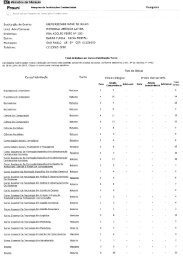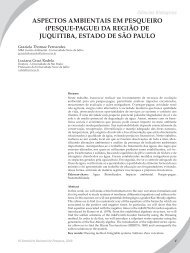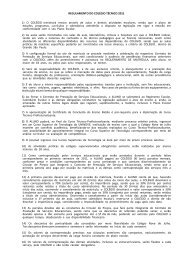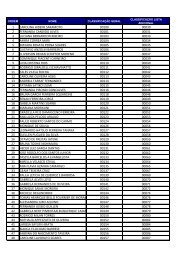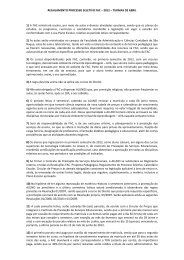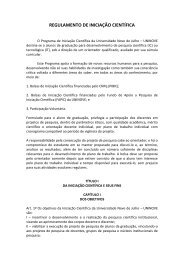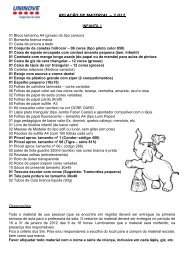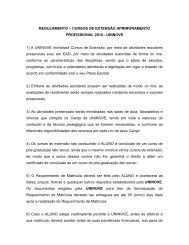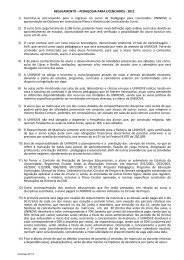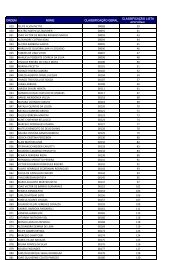Dannylo Wesley Nóbrega de Sousa - Uninove
Dannylo Wesley Nóbrega de Sousa - Uninove
Dannylo Wesley Nóbrega de Sousa - Uninove
You also want an ePaper? Increase the reach of your titles
YUMPU automatically turns print PDFs into web optimized ePapers that Google loves.
glucose-fed rats was associated with a reduction of plasma monounsaturated fatty acids<br />
(contributing to insulin resistance) 23 , indicating that kinin B1 receptor may be involved in<br />
the signaling of obesity.<br />
Obesity is a chronic mild inflammation disease linked to augmented levels of pro-<br />
inflammatory cytokines in the circulation and peripheral tissues 24 . Adipose tissue actively<br />
secrets a variety of adipocytokines (leptin, resistin, adiponectin, IL-1β and TNF-α) 25 that<br />
contributes to the inflammatory process, and also are involved in appetite and satiety<br />
signals, energy balance and energy expenditure. Dysregulation of adipose tissue-<strong>de</strong>rived<br />
IL-1β and TNF-α results in impaired insulin signaling and lipid metabolism 26 .<br />
As kinin B1 receptor is induced and up-regulated following tissue injury, its contribution to<br />
inflammatory states has been shown, initially mediating neutrophil migration and<br />
infiltration of macrophages 14 . Kinin B1receptor activation on these cells causes the release<br />
of cytokines 27 . Kinin B1 receptor antagonist reversed the infiltration of macrophages in<br />
inflammatory tissue 28 . Macrophages represent an important source of pro-inflammatory<br />
cytokines known to propagate and amplify the inflammatory process in adipose tissue 29 .<br />
In addition, functional <strong>de</strong>ficiency of the kinin B1 receptor can protect mice from obesity<br />
through a mechanism that may involve leptin signaling 30 . Thus, a possible therapeutic use<br />
of kinin B1 receptors antagonist in Cushing’s syndrome is strengthened with the results<br />
from our study.<br />
Conclusion<br />
Our data suggest that chronic hypercortisolism, as seen in Cushing's syndrome is related to<br />
the higher amount of kinin B1 receptors mRNA in VAT, the fat <strong>de</strong>posit responsible for<br />
obesity-related complications and increased mortality. Gene expression of kinin B2<br />
receptor remained unchanged. Based on these preliminary results, we intend now to<br />
compare the group of patients with Cushing's syndrome with obese and nonobese subjects.<br />
The extraction of biological material of these new groups has already been performed and<br />
the mRNA expression analysis is being <strong>de</strong>veloped in our laboratory. In addition, we are not<br />
sparing efforts to increase the number of patients with Cushing's syndrome, which will<br />
allow a more accurate analysis of kinin B1 and B2 receptors expression in human adipose<br />
<strong>de</strong>posits.<br />
30




